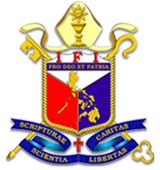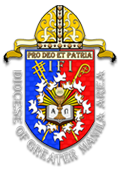By Bp. Warlito P. Baldomero
The Birth of Jesus the Messiah

- INTRODUCTION
What we are celebrating every December 25 is not the “birthdate” of our Lord Jesus but the “fact” that “…unto us a Son is born, unto us a Son is given, and the government will be on His shoulder, and He will be called Wonderful Counselor, Mighty God, Everlasting Father, Prince of Peace” (Isaiah 9:6). The date December 25 has been a subject of debate in some religious circles because it does not coincide with the preponderance of the historical evidences. In the Lukan narrative, the shepherds were said to have been in the open field watching their flocks by night. In the clear starry sky a company of angels was singing the “Gloria en Excelsis Deo,” heralding the birth of the Messiah. This could not have happened during the winter season. The shepherds would rather stay inside their warm houses to avoid being frozen to death out on the field. And that was also the time when Emperor Augustus ordered that all citizens of the empire be accounted for in the first census he ever instituted. Expecting a good turn-out of the census results, this must have been done at a time when people could travel in warm-and-dry weather. At present, the celebration of the Birth of Jesus the Messiah is commonly and generally associated in the western countries with white Christmas, with snow and snowman, and generally projecting a winter ambiance.
There was a point in world history that the then calendar was found to contain wrong assumptions that a year lasted 365.25 days when in reality it is about 365.2422 days. To rectify the errors and to determine the exact date of Easter, Pope Gregory XIII commissioned a group of knowledgeable men to make the right calculation to put into effect the renewal of the civil calendar. The former calendar contained only ten months, namely: January, February, March, April, May, June, September (Seventh), October (Eighth), November (Ninth), December (Tenth). Two months had to be added to correct the discrepancy. The month of July with 31days in honor of Emperor Julius and August with 31 days in honor of Emperor Augustus were added. It was the insertion of these two months in between the months of June and September that pushed the month of December two months further and thus greatly affected the reckoning of the season. When the Gregorian calendar was introduced, he issued a papal Bull for its adoption in October 1582.
However, the Universal Church could not put aside the FACT that Jesus the Messiah was born on a certain date, and chose December 25 to settle the contentious issue of the new Christians’ vacillating between celebrating the pagan holiday, Winter Solstice or Festival of Lights honoring their Sun God. or the Christmas holiday honoring Jesus the Messiah. From then on, the Christians celebrated Christmas on this date and fully separated from their early pagan traditions.
- THE CIRCUMSTANCES SURROUNDING JESUS' BIRTH
- Mary Pledged to be Married to Joseph (The Betrothal).
The Gospel narrative does not specify the date of the betrothal of Joseph to Mary. But according to Talmud, the Jewish oral tradition as taught by Rav Yehuda, “40 days before a male child is conceived the heaven already announces whose daughter he is going to marry.” This “bashert,” an arrangement which means fate or destiny, is a match made in heaven. Perhaps this was the kind of betrothal that Joseph and Mary entered into. Mary was pledged by her parents Joaquin and Anna to be married to Joseph. “Bashert,” however, does not guarantee a trouble-free marriage, because, like everything worthwhile in life, marriage requires dedication, mutual love and respect. But husband and wife should build up the marital harmony, known as "shalom bayis," highly valued in Jewish tradition. The Talmud states that “a man should love his wife as much as he loves himself, and honor her more than he honors himself.” Even when two people are meant for each other, in reality it is still possible for them to ruin their marriage.
Joseph was a carpenter by occupation. Like any young man preparing to have a family of his own, he ventured to work away from home; maybe an overseas work. No one could tell how long they had been separated by time and space. Despite Joseph’s yearning, perhaps Joseph had always borne in mind the vows of Ruth to Naomi: “Don’t urge me to leave you or to turn back from you. Where you go I will go, and where you stay I will stay. Your people will be my people and your God my God. Where you die I will die, and there I will be buried. May the LORD deal with me, be it ever so severely, if even death separates you and me.” This vow is used also in Jewish marriage ceremony.
- Joseph's Discovery of Mary's Condition
Joseph came home and was disappointed to see his beloved Mary pregnant. He felt in his mind that Mary cheated him and had committed infidelity. No explanation could appease his anger despite Mary’s rationalization that the baby in her tummy was the work of the Holy Spirit. There was never a woman in the human history that was impregnated by the Holy Spirit. Even Sarah, wife of Abraham in her menopausal age, did not bear a son through the Holy Spirit.
-
Joseph's Decency and Dilemma
Because Joseph, her husband-to-be, was faithful to the law and did not want to expose her to public disgrace, he had in mind to divorce her quietly. Though their betrothal was believed to be a “bashert,” an arrangement or match made in heaven, divorce could still be resorted to for reason of unfaithfulness and this was allowed in Judaism. As they were not married yet, the betrothal ceremony called “kiddushin” which Joseph had with Mary was only the ritual of sanctification of their love. While Joseph was pondering on his plan to divorce Mary secretly, he fell into a deep slumber, and in his dream an Angel of God conversed with him
- Angel's Message to Joseph
In his dream the Angel said, “Joseph son of David, do not be afraid to take Mary home as your wife, because what is conceived in her is from the Holy Spirit. She will give birth to a son, and you are to give him the name Jesus, because he will save his people from their sins.” All this took place to fulfill what the Lord had said through the prophet, “The virgin will conceive and give birth to a son, and they will call him Immanuel” (which means “God with us”). In the Bible, dreams are believed to convey divine message. This is dramatically shown in the story of Joseph the dreamer in Genesis where all the dreams that he had did come true. We have learned that there are two kinds of dreams: Latent and Manifest dreams. The Latent dream is a manifestation of our hidden desires, plans, covert wishes underlying in our sub-conscious mind. However, the Manifest dream is believed to convey a heavenly message. Joseph believed in angels as messengers of God. Being a righteous man, he soulfully submitted himself to the will of God. He took Mary home as his wife. The actual Jewish wedding ceremony is called “nissu’in or chuppah” which brings about the legal consequences of the change of status of the woman.
- Joseph's and Mary's Reconciliation due to Faith in God
But Joseph did not consummate their marriage until she gave birth to her son. And he named the baby “Jesus”. The “bashert” (match in heaven or pre-destined marriage) has been fulfilled in the marriage of Joseph and Mary. Their marriage was part of the saving grace for the world. Mary could have been hurt of the negative reaction and seeming reluctance of Joseph to take her as his wife upon knowing of her real condition, but she relied wholly trusting in God’s care that paved the way to a happy reconciliation. Their example of obedience to the will of God makes our celebration of Christmas wholesome and merry.



